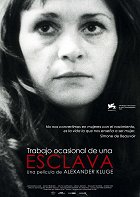Ohjaus:
Alexander KlugeKuvaus:
Thomas MauchNäyttelijät:
Alexandra Kluge, Bion Steinborn, Ursula Birichs, Traugott Buhre, Alfred Edel, Walter FlammeArvostelut (1)
An ironic and self-ironic leftist film that can also cut into life in a lighter spirit (I do not just mean the very dense abortion scene, which must have been censored at the time). The first half of the film is fully "feminist" matter: the main protagonist herself effectively supports men and children, as a result of which she has no time for her own life and self-development, the female "double shift" par excellence, unquestioned by the social norms of the time. After Roswitha is forced to leave her profession (notice that she does not choose to do so herself, but it is imposed on her by external necessity), her personal transformation begins, almost negating her previous mode of existence - Roswitha is actually the only person throughout the film who tries to take authentic action in the context of the factory, once again surpassing men (in the plural), including her own husband (in the singular), when her personal energy is directed outward into the world, towards socially pressing issues, instead of into the family. Her beginner's idealism is the source of a number of tragicomic situations, and the point with the preservation of production in her husband's factory is a typical example of how our society works: the factory is not closed in the end, and the employees can be satisfied, but as it turns out, the arbitrariness of corporate management turns people into passive objects, who can only wait and see if they will be able to support their families tomorrow or not. In the words of a factory security guard: "There are many places where the public can freely move. Streets, squares, department stores, public toilets, parks..." But factories are not on the list... Kluge's unique style - combining social-critical documentary with the formal finesse of Godard's New Wave, with all its intertextuality and irony through film techniques (such as contrasting references to the Soviet revolutionary "Chapaev") or (now only Kluge) juxtaposition of the past and present, whether artistic or historical.
()
Kuvagalleria (4)

